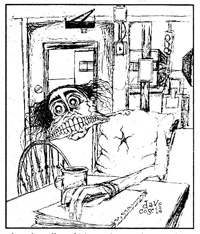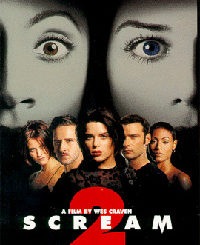 Romeo & Juliet
Romeo & Juliet
with Claire Danes, Leonardo DiCaprio, John Leguizamo
Written by William Shakespeare
Directed by Baz Luhrmann
by William Ham
The man that Lord Buckley called “Willie the Shake” has recently become the most in-demand screenwriter in film. Of course, Shakespearean cinema is a sub-genre nearly as auld as the medium itself, but ever since Kenneth Branagh’s thrilling adaptation of Henry V in 1990, followed close behind by Gus Van Sant’s partial updating of its prequel, My Own Private Idaho, the Bard’s filmed works and variations thereof have steadily grown into ubiquity. In the last eighteen months alone, we’ve had Branagh’s Othello (with Cowboy Curtis in the title role), Ian McKellen’s radical restaging of Richard III in a fantasized ’30s England, Al Pacino’s radical restaging of the same play in a fantasized ’90s New York (one where Winona Ryder actually acts), Trevor Nunn’s semi-radical restaging of Twelfth Night in a quasi-fantasized Victorian England (one with Helena Bonham Carter – lucky folks), and Branagh’s upcoming non-radical restaging of Hamlet in a fantasized 1996 Christmas movie season (one where American moviegoers will sit still for four hours). Now comes the most radical restaging to date, Australian director Baz (Strictly Ballroom) Luhrmann’s Romeo and Juliet. If, as many have suggested, Willie’s doing backflips in his grave, it’s not because of the audacity of the aforesaid reimaginings, but because, being 380 years dead, it’ll be hard to get the residuals to him.
By now, you’ve probably heard the howls of outrage from Shakespearean purists over Luhrmann’s attempt to make the most famous love story of all time palatable for the quick-cut MTV/Tarantino generation. As far as I’m concerned, these superattenuated pantywaists can just stay home and shout I, Claudius dialogue back at the TV. This is not for them. Luhrmann knows that this tale has been told and told frequently – from Franco Zefferelli’s heavy-breathing 1968 version to West Side Story, Abel Ferrara’s China Girl, and practically every teen romance made in the last fifteen years. His achievement, and most likely the thing that’s got the oldsters’ Depends up in a bunch, is that he lifts the dialogue wholesale and throws it into a thoroughly contemporary (and, God help us, post-modern) package while keeping the core story pure.
Walk into the theatre after the opening credits have rolled and you might think you’ve stumbled upon the latest Robert Rodriguez film by mistake – the first, dialogue-free sequence is a hyperkenetic gun battle at a gas station, with members of the rival Montague and Capulet clans blowing one another away with semi-automatic weapons (with brand names like Dagger and Longsword) in both fists, punctuated by intermittent freeze-frames to introduce the characters, Mean Streets-style. The setting is Verona Beach, a run-down, sun-baked community overlorded by the opposing (corporate) families, the scions of which are played by Brian Dennehy and Paul Sorvino, both always welcome presences on screen. Each of the familiar characters are given a new spin by the brilliant casting and the suitably over-the-top performances of each – Tybalt, Juliet’s cousin, is memorably portrayed by a hissing John Leguizamo, and Romeo’s crony Mercutio is played by Harold Perrineau as a flamboyant, passionate cross-dresser (one of the elements that has the leotard set most up in arms – sure, the Shake never had men dressed in women’s clothes in his plays). Mercutio snags an invite to the Capulet’s costume ball, which he gives to Romeo, along with a hit of LSD. It is there, on either side of a fish tank, that the star-crossed lovers first catch sight of each other and are immediately and eternally smitten. (Hey, I’m not giving too much of the story away, am I?) Their whirlwind courtship commences with the famous balcony scene, which here takes place mostly in the Capulets’ swimming pool. But blood is thicker than water, especially when it’s spilt everywhere, and complications set in immediately: Juliet has been promised to “Dave” Paris (Paul Rudd, last seen in Clueless), Verona Beach’s most eligible bachelor, not to mention an irredeemable dork. Family ties being what they are, the kids run off to be secretly wed by Friar Lawrence, depicted by Pete Postlethwaite (the guy at the bottom of the coffee cup in The Usual Suspects), a hip priest with a big Celtic cross tattooed on his back who teaches his choir “When Doves Cry” (was that in the original?). Tybalt kills Mercutio, Romeo kills Tybalt, and the honeymoon is cut short when Romeo is forced to lay low at a trailer park in the desert. Juliet is forced into marrying Paris, and Lawrence hatches a scheme that should bring the lovers together forever, and does, but not quite as planned.
No doubt you knew most of this already, but the thrill of this retelling is in the details. There is nary a word here that isn’t Billy’s old-school iambic pentameter, even in the mouths of TV commentators, in newspapers, and on billboards (which is the source of much of the comedy here – watch carefully to pick up the names of the shops on the beach and the very ’90s way Lawrence tries to dispatch the news of Juliet’s so-called death to Romeo). The set design is gorgeous, full of affluence, decadence, and decay. But none of this would matter if you didn’t buy the love story at the center, and that’s where Romeo and Juliet shines most brightly. Leonardo DiCaprio and Claire Danes are letter-perfect, dripping with passion and ardor, movingly capturing the joy and horror of adolescent love, drawing out the truth in the convolutions of Shakespeare’s deep-purple prose. The final scene, staged as opulently as any that came before it, even managed to bring a tear to the eye of this jaded reporter (something that hasn’t happened since I realized I paid full price to see The Island of Dr. Moreau), all due to the talent of the two leads who wring fresh tragedy out of a well-worn denouement. So maybe the author wouldn’t be so displeased with this version after all – in the end, Romeo and Juliet arouses the same response from the groundlings of today that he intended in Queen Bess’ time. And Big Bill was nothing, if not a crowd-pleaser.



